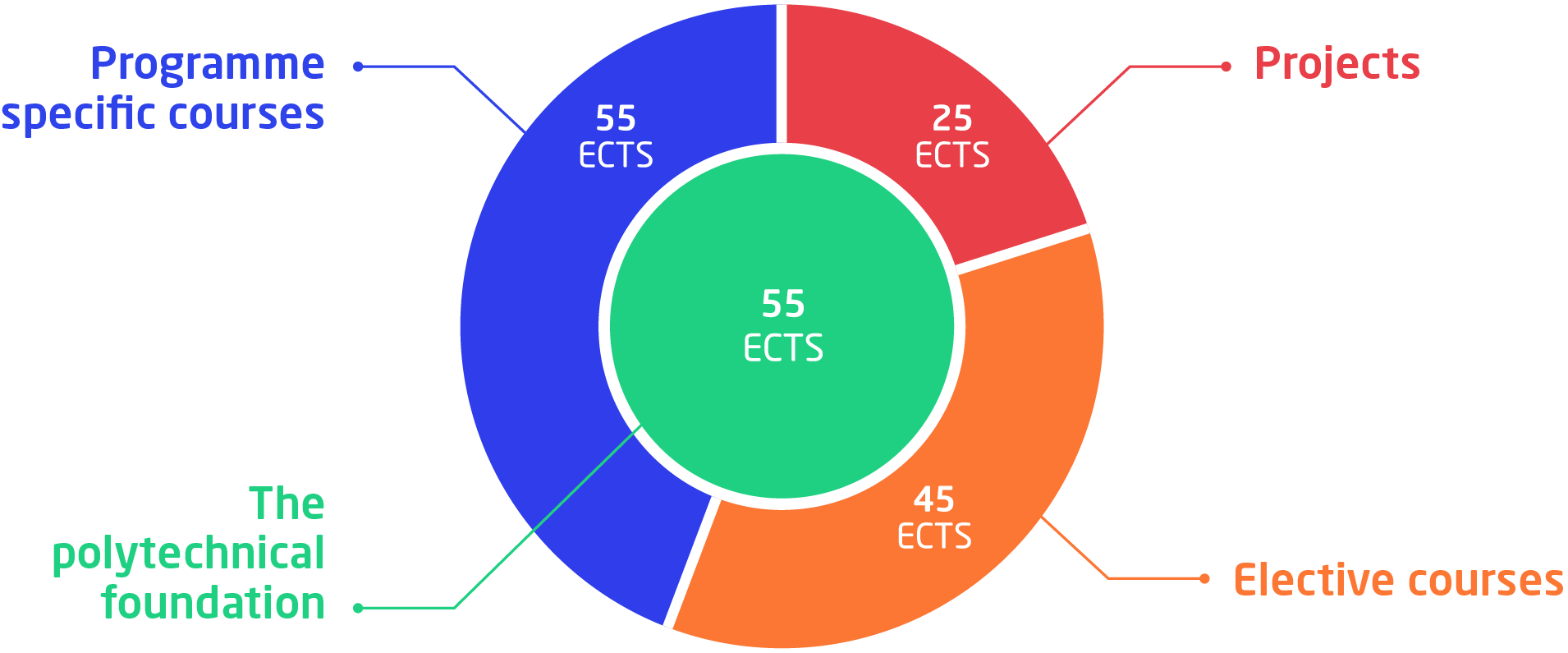55 ECTS
The polytechnical foundation
In this course block, which is mandatory in all study programmes, you will get a detailed introduction to these subjects - and always in a relevant technological context.
The Bachelor of Science, BSc, programme is a research-based undergraduate engineering programme that qualifies the student for a MSc programme.

The BSc Eng programme is composed of four basic blocks of courses. During the programme, students must pass courses within each of these four blocks, corresponding to 180 ECTS credits points.

55 ECTS
55 ECTS
All BSc programmes include a number of courses that are specific to the particular programme.
Programme specific courses help ensure that you acquire an accurate picture of what, for example, Life Science Engineering or Civil Engineering is about, and how it can be used in society.
If, for example, you choose Life Science Engineering, this will comprise courses such as ‘biochemistry’, ‘molecular biology’, and ‘bioinformatic methods’. If, for example, you choose Civil Engineering, your programme specific courses will include ‘construction technology’, ‘thermal building physics’, and ‘concrete construction’.
45 ECTS
You have ample opportunity to create your own unique academic profile as a BSc student at DTU.
In your block of elective courses, you can choose from several hundred different courses from DTU’s course catalogue, or you can take courses at another university—in Denmark or abroad.
You can steer your BSc programme in exactly the direction you want, and thus tailor the options open to you when choosing an MSc programme.
25 ECTS
During your BSc programme, you will prepare two major projects. The projects help highlight and summarize everything you have learned and also give you the opportunity to immerse yourself in a topic you find exciting.
The first project - the subject project - falls halfway through your study programme. In addition to dealing with a subject-relevant topic, the project itself is an exercise in how to prepare a project and engage in teamwork.
Your study programme is concluded with a BSc project, where you will have the opportunity to work in a qualified manner with a problem in the subject area of your study programme and to use a lot of what you have learned during your study programme to create results and new knowledge.
The polytechnical foundation contains courses that give you a solid scientific foundation for developing technological solutions to complex, global challenges.
The courses are compulsory in all fields of study, both in the bachelor's and master's programmes.
In the bachelor's programme, the polytechnical foundation consists of courses in
The courses give you the basic skills you need as a graduate civil engineer:
Learn more about the polytechnical foundation in the master’s programmes

DTU’s BSc Eng study programme is designed to give students considerable freedom of choice throughout their studies. As the diagram shows, students actually decide the content of one quarter of their programme. By choosing between several hundred courses from DTU’s extensive course offering, you can practically custom-make your own education.
On the majority of bachelor study lines, different proposals for study programmes have been drawn up which can provide a useful source of inspiration.
Once students hold a BSc Eng in technical science, they are qualified to start on a MSc Eng programme at DTU. However, with a bachelor's degree from DTU, graduates can also apply to do an MSc at another university.